Introduction
Keyword research is the cornerstone of any successful SEO strategy, acting as the roadmap for optimizing your website’s content and structure. It helps you understand what your target audience is searching for online. It will guide you to make your content meet your reader’s needs and rank higher in search engine results pages (SERPs).
This comprehensive guide is designed to take beginners through the fundamentals of keyword research, ensuring you have the tools and knowledge to attract more organic traffic to your website very effectively. I am Shankar Halder a professional SEO Expert from Bangladesh. In this article, I will discuss how to do keyword research for SEO. Let’s start.

What is a Keyword?
A Keyword is a specific term or word that summarizes the essence of a topic, blog, or article. It uses in digital content to optimize search engine rankings. It acts as a bridge connecting user queries to relevant online content, enabling search engines to identify and display the most relevant information for readers.
By prudently selecting and incorporating keywords, content creators enhance visibility and accessibility, attracting targeted audience engagement to websites, blogs, posts, or articles.

Types of Keyword in SEO:
Keywords play a pivotal role in search engine optimization (SEO) and digital marketing strategies, helping to connect user queries with relevant content. Here’s a detailed look at the various types of keywords:
Short-tail Keywords:
These are broad, one to three-word phrases with a high search volume but also high competition. Short-tail keywords are more general, such as “shoes” or “digital marketing,” and while they can attract a large audience, they often have lower conversion rates due to their lack of specificity.
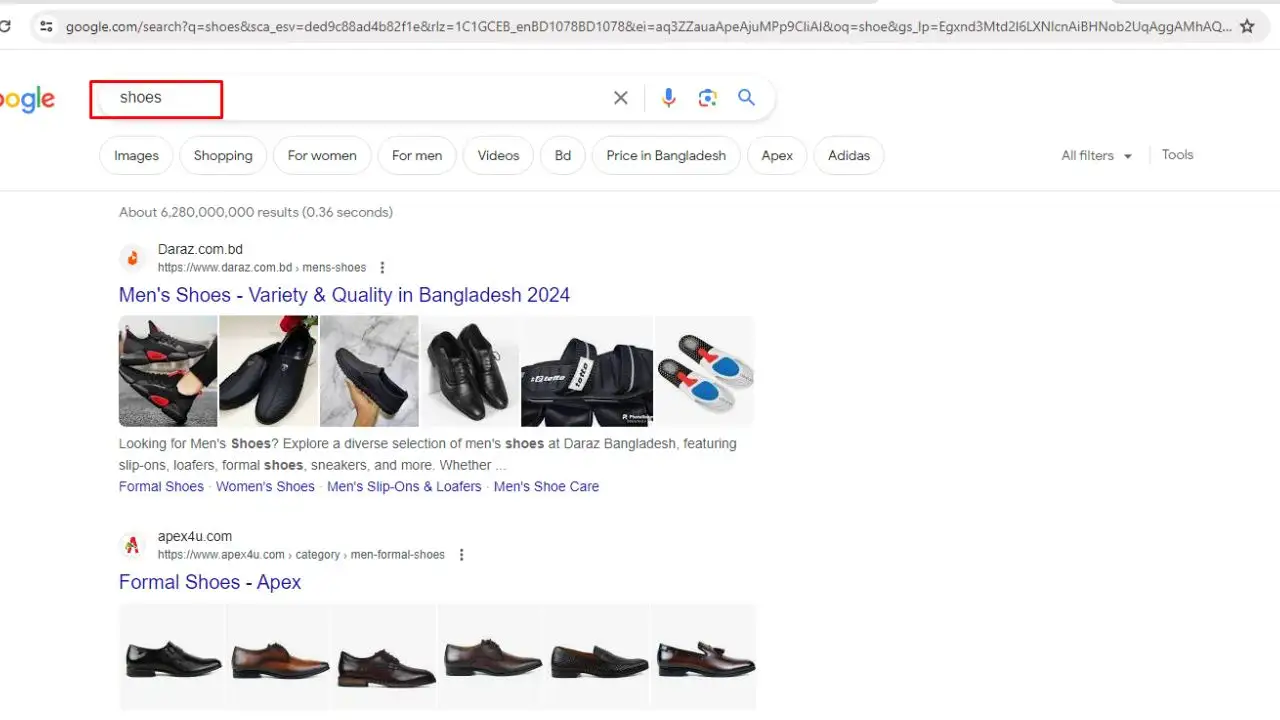
Long-tail Keywords:
Longer and more specific phrases, usually three words or more, that are closer to what users might type into a search engine when they are closer to a point-of-purchase or using voice search.
For example, “women’s waterproof hiking shoes” is a long-tail keyword. These keywords typically have lower search volume but higher conversion rates because they target users with more specific intents.
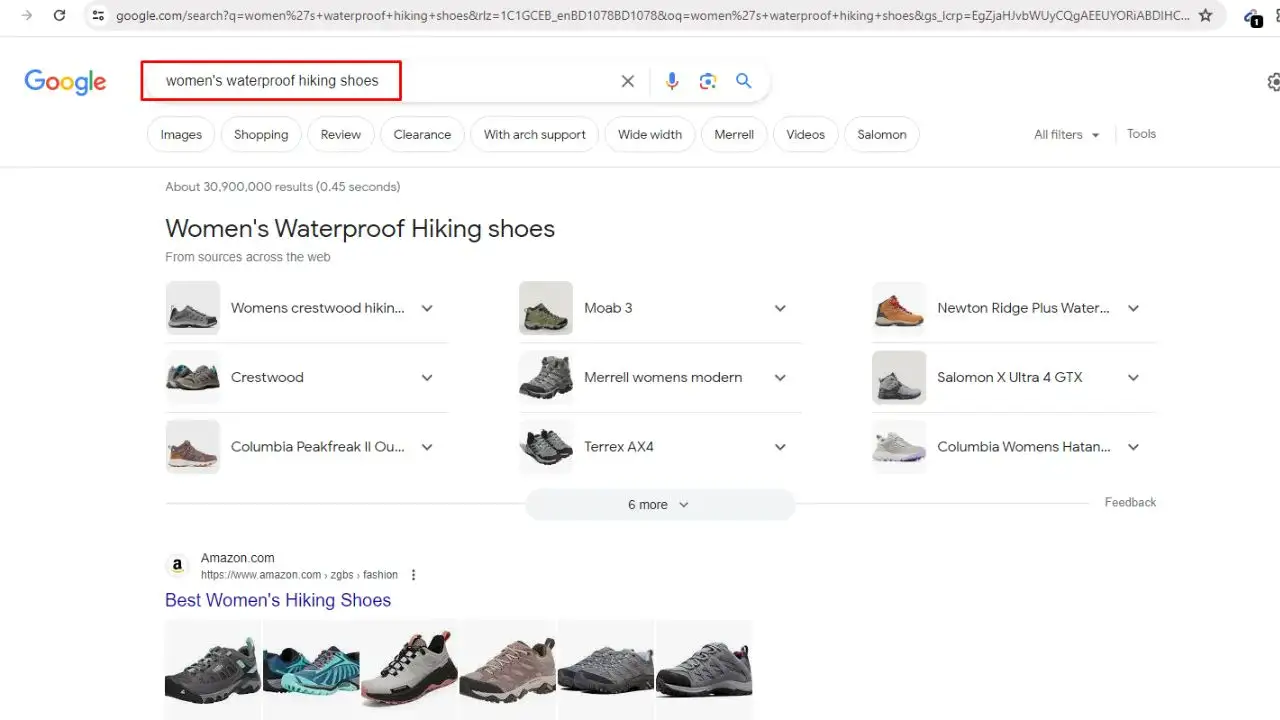
Primary Keywords:
The main keywords that most closely describe the content or product offered on a webpage. These are the keywords that you prioritize in your SEO efforts, ensuring they appear in critical places like titles, headings, and meta descriptions.
For instance, if you’re selling organic coffee, “organic coffee beans” could be a primary keyword.
Secondary Keywords:
These are related to the primary keywords but are used to support and elaborate on the content. They help capture a broader range of search queries. Secondary keywords can be synonyms or variations of the primary keyword, helping to attract additional traffic without repeating the same phrases.
Using the organic coffee example, secondary keywords could include “best organic coffee,” “natural coffee beans,” and “fair-trade coffee brands.”
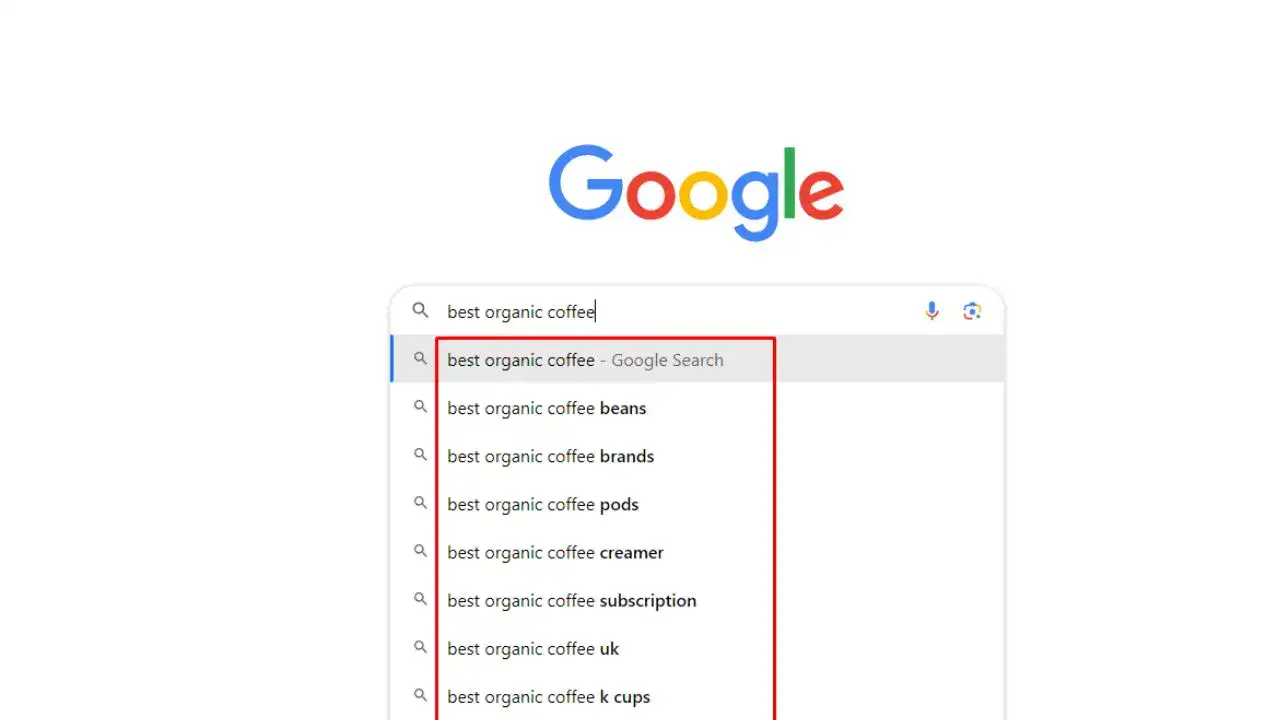
LSI Keywords (Latent Semantic Indexing):
These are semantically related to the primary keyword and help search engines understand the content’s context better. LSI keywords are not synonyms but are related terms that often appear together.
For example, for a page optimized for “digital marketing,” LSI keywords might include “SEO,” “content marketing,” “online advertising,” and “social media marketing.”
Geo-targeted Keywords:
These include a specific location to target users searching for products, services, or information in a particular area. They are crucial for local businesses and SEO strategies. A geo-targeted keyword might be “coffee shop in downtown Toronto,” aiming to attract local customers.
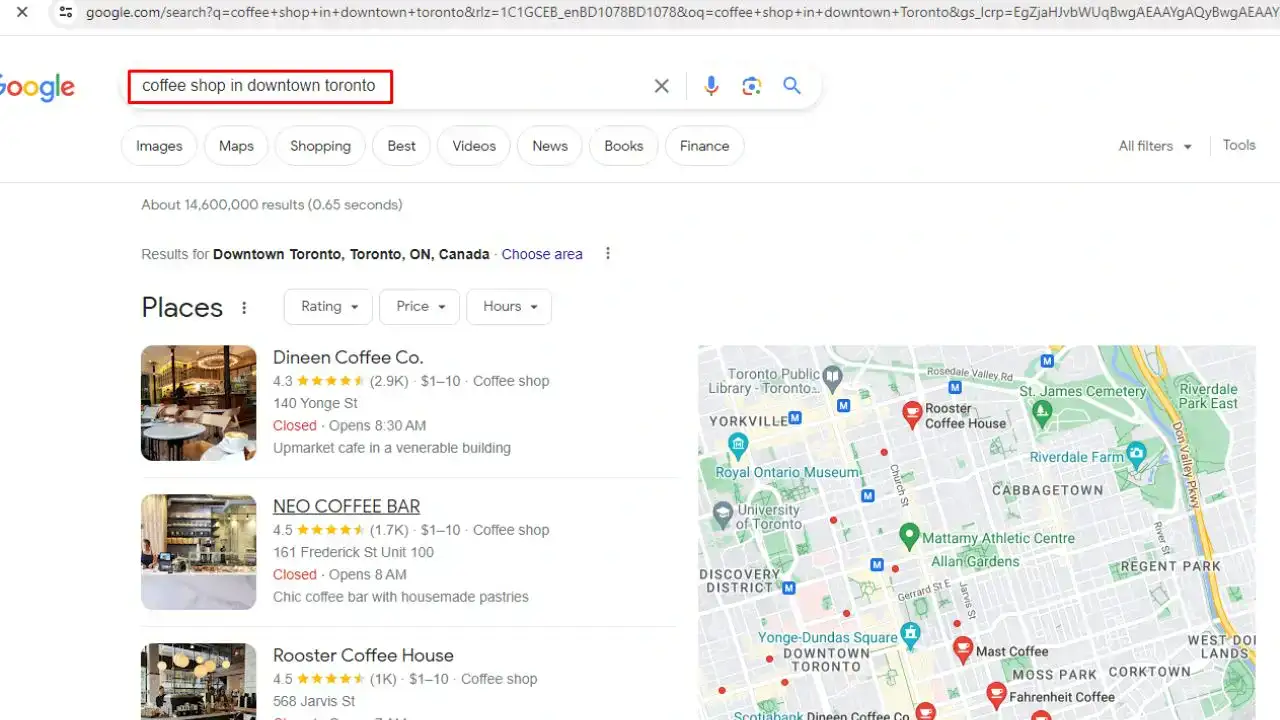
Brand Keywords:
These involve the brand’s name or specific product names. Users already familiar with the brand or looking for it specifically use these keywords. For instance, “Nike running shoes” or “Apple iPhone 12.”
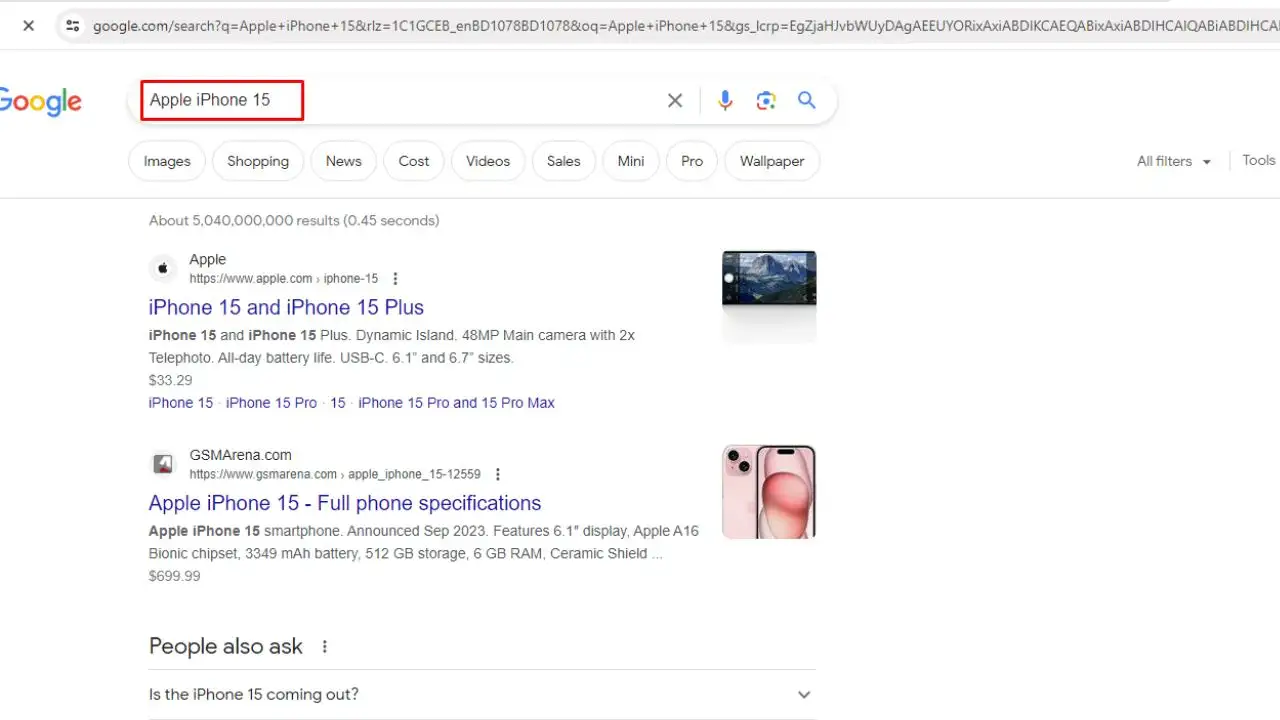
Negative Keywords:
Used in pay-per-click (PPC) advertising, these are words or phrases you specify that you do not want your ads to appear for. They help refine targeting by excluding irrelevant searches, thereby saving advertising budget and improving campaign relevance.
Product Keywords:
These are directly related to the products or services a business offers. They are very specific and often include product names, model numbers, or specific services offered.
For example, the “Canon EOS 5D Mark IV DSLR camera” targets users specifically searching for this camera model.
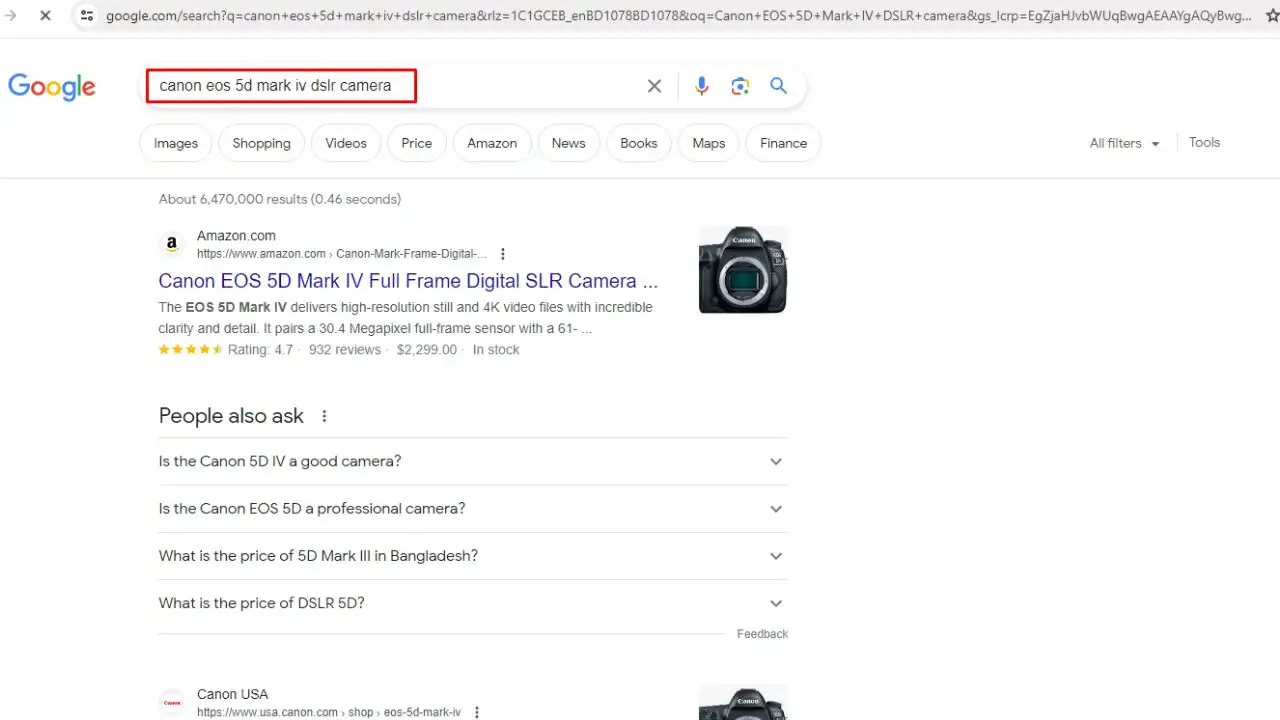
Industry Thought Leader Keywords:
These keywords are associated with influential figures or authoritative sources within a specific industry. They might include the names of industry leaders, influencers, or branded methodologies. They attract traffic based on the reputation and expertise of thought leaders, for instance, “Seth Godin’s marketing strategies” or “Keyword research by Neil Patel”.
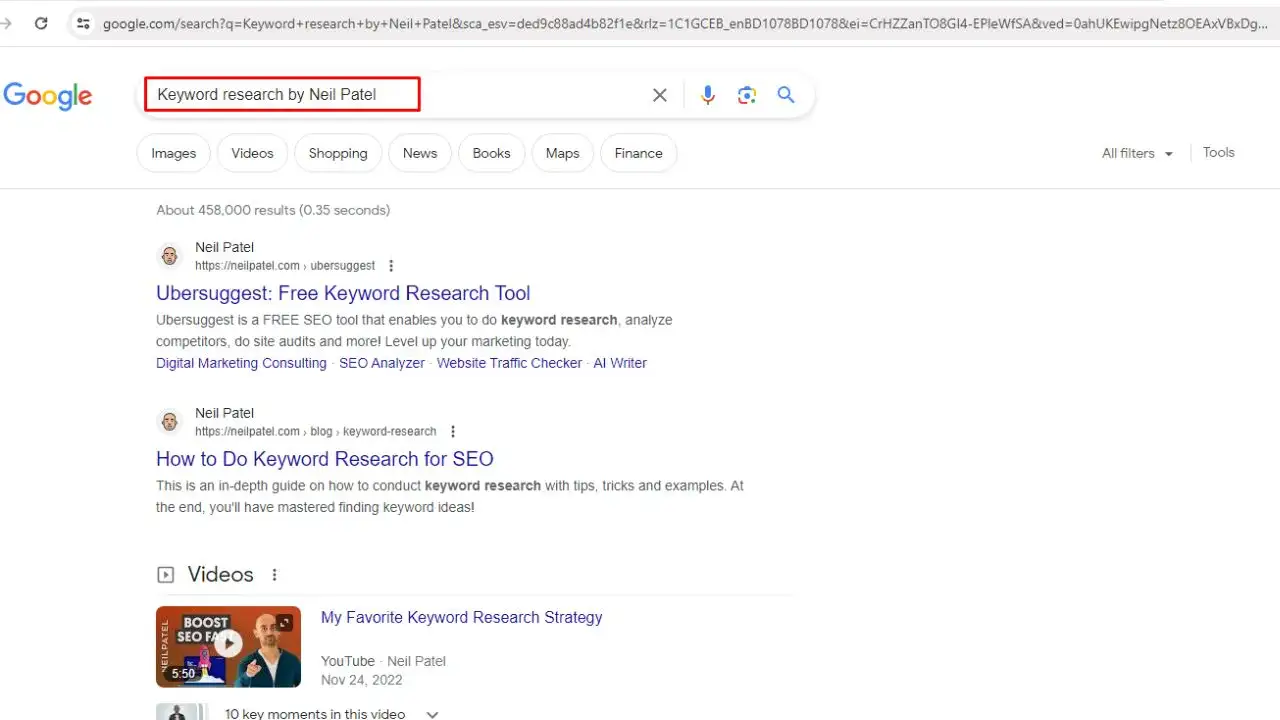
Customer-Defining Keywords:
These keywords specify a particular segment of the customer base. They are used to target content and marketing efforts towards a specific group of users defined by their characteristics, such as “gifts for new mothers” or “software for small business owners.”
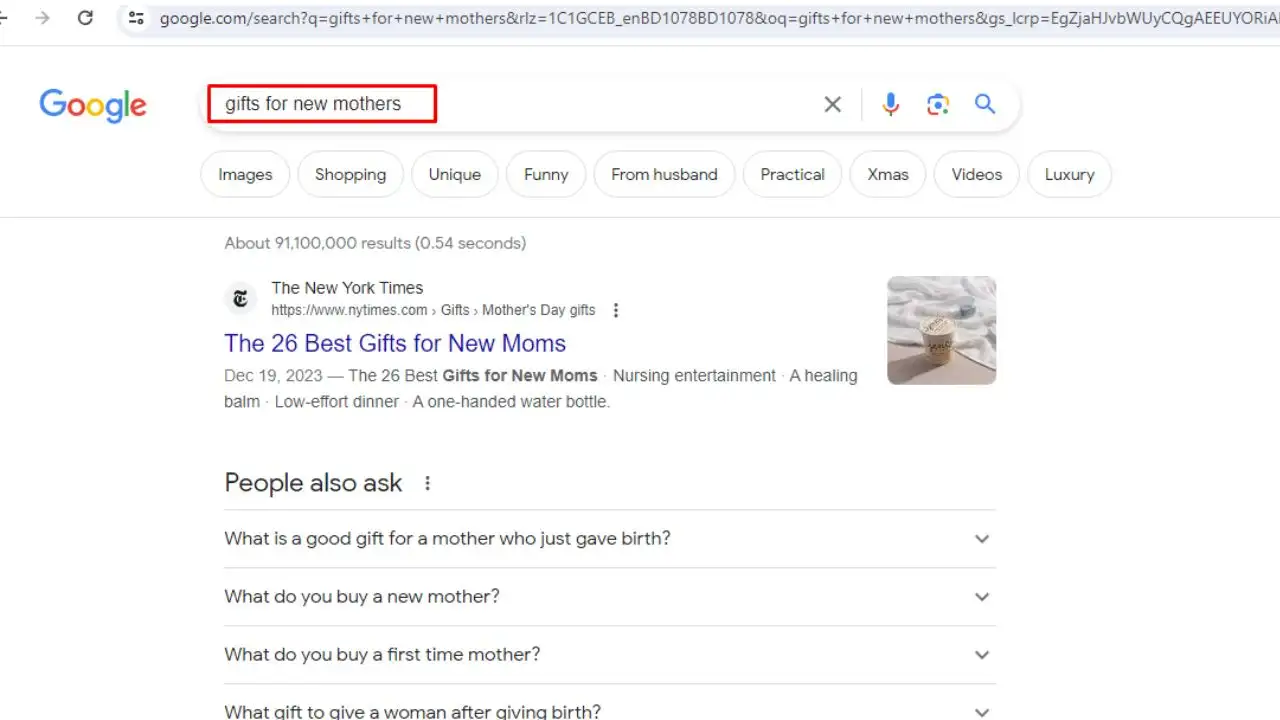
Seasonal Keywords:
These are related to specific times of the year, events, or holidays. They are crucial for businesses that have products or services which experience fluctuating demand throughout the year.
Examples include “Christmas decorations sale” or “summer travel deals.”

Intent-Targeting Keywords:
These are chosen based on the user’s intent behind a search query, which can be informational, navigational, transactional, or commercial investigation.
For example, “How to fix a leaking tap” (informational), “nearest plumber” (navigational), “Buy plumbing tools online” (transactional), and “Best plumbing tools reviews” (commercial investigation).
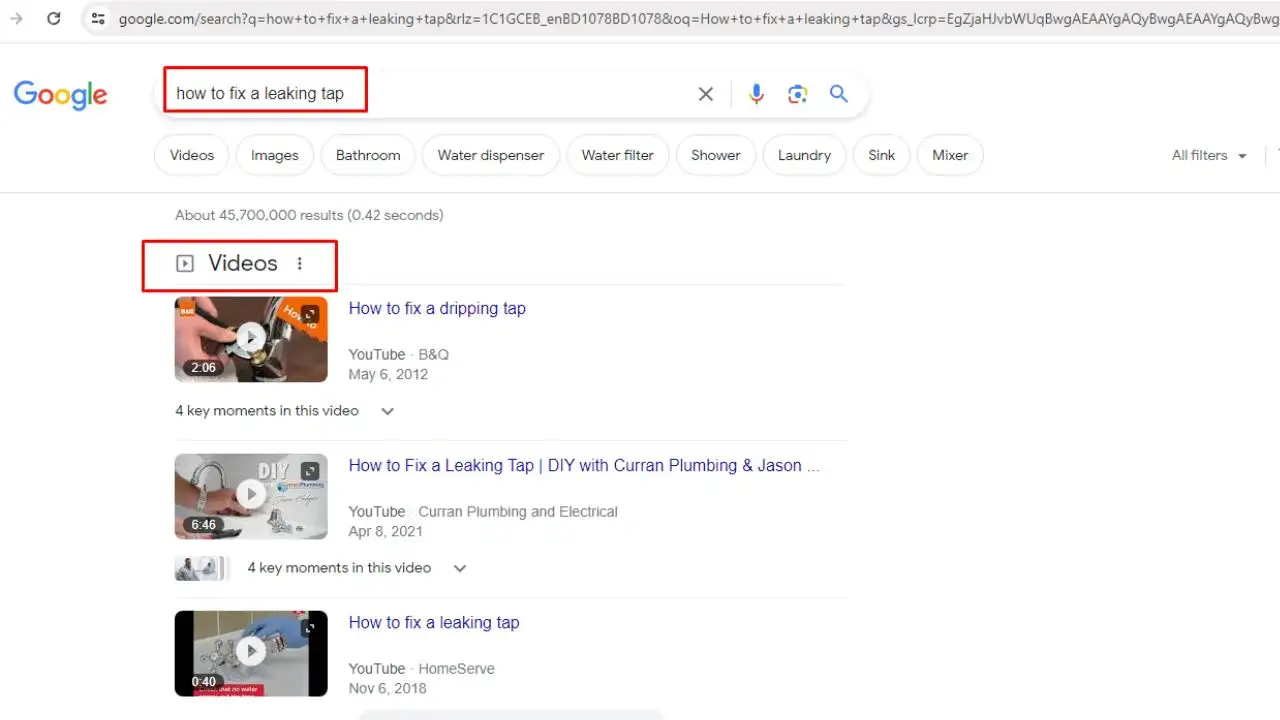
Question Keywords:
With the rise of voice search and the increasing number of users asking direct questions to search engines, question keywords begin with who, what, where, when, why, or how.
For example, “What is SEO?”, “Which are the best keywords research tools for SEO?” or “What are the differences between International keywords and Local keywords?” These keywords are particularly useful for content that aims to provide answers or solutions.
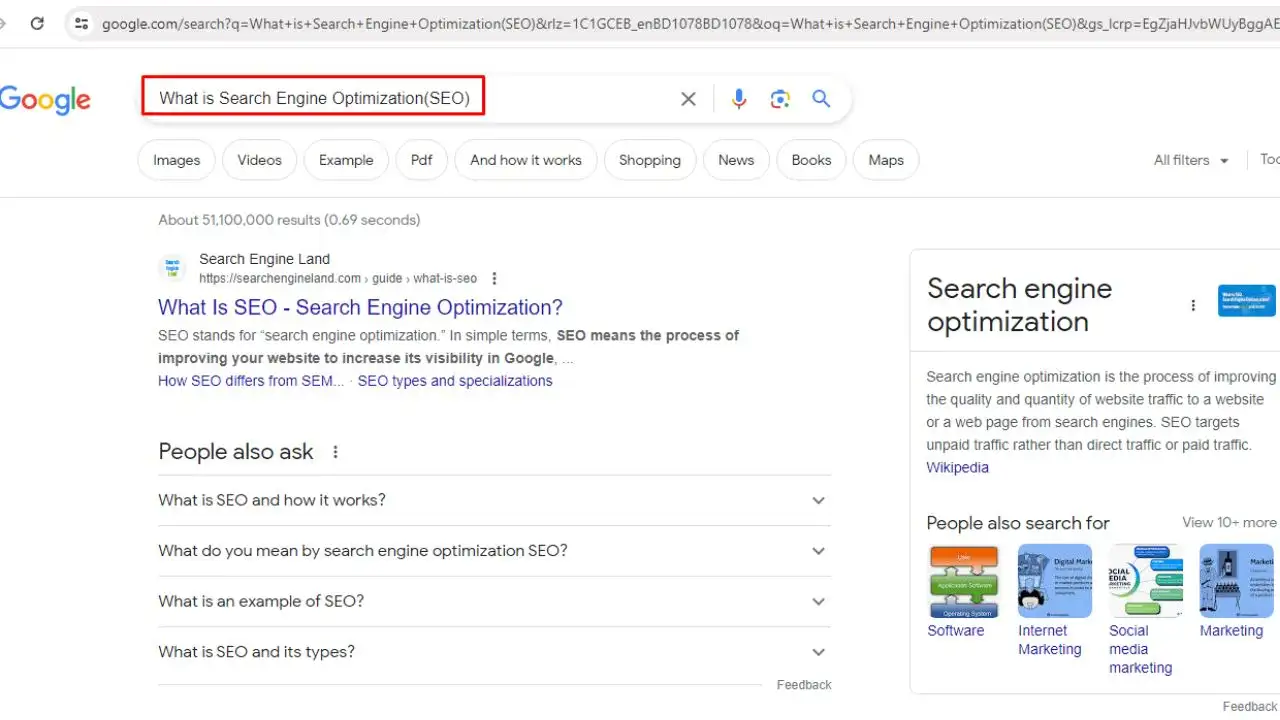
Comparison Keywords:
Users often search for comparisons when they’re closer to making a purchase decision but are still considering their options. These keywords often include “vs,” “or,” and “compared to,” such as “MacBook Pro vs. Dell XPS” or “best Android phones compared to iPhone.”
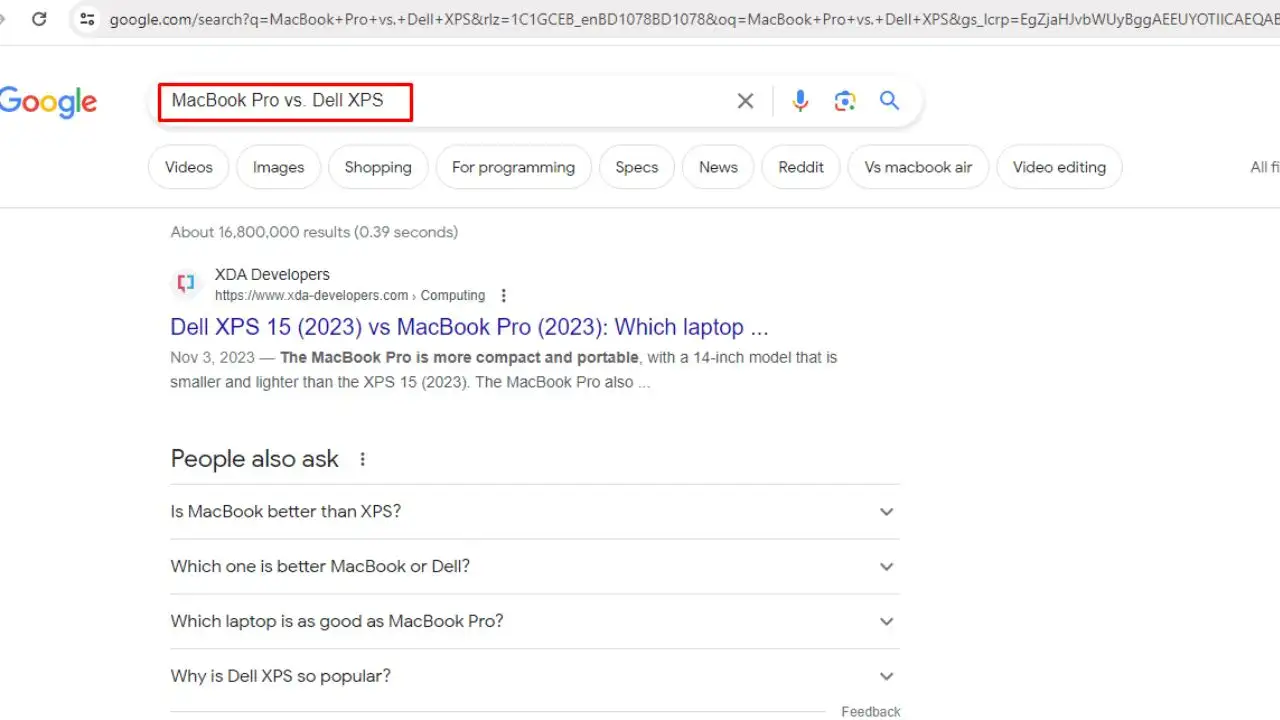
Commercial Keywords
Commercial keywords are crucial to SEO and digital marketing strategies, particularly for businesses that drive sales through their online presence. Commercial keywords are search phrases that users type into search engines in the buying phase of their customer journey.
These keywords indicate a solid intent to purchase products or services and are highly valuable for businesses because they target potential customers closer to making a buying decision.
What is Keyword Research?
Without Keyword Research, it is totally impossible to stand first page of any search result page in present competitive edge. It involves identifying the words and phrases potential customers use in search engines when looking for products, services, or information related to your business. It goes beyond merely compiling popular search terms; it’s about diving deep into the motives behind these searches to craft content that answers users’ questions and outperforms competitor offerings.
This strategic exploration is essential for aligning your online content with audience needs, ensuring your website speaks their language. Businesses can make their digital marketing efforts by effectively decoding the search intent to capture the right traffic, enhancing visibility and engagement. This foundational step informs content strategy and shapes SEO and marketing initiatives, laying a solid foundation and groundwork for online success.
Types of Keyword Research:
In the field of SEO, you will acquainted with different types of keyword research method. I will discuss most useful method for SEO keyword research.
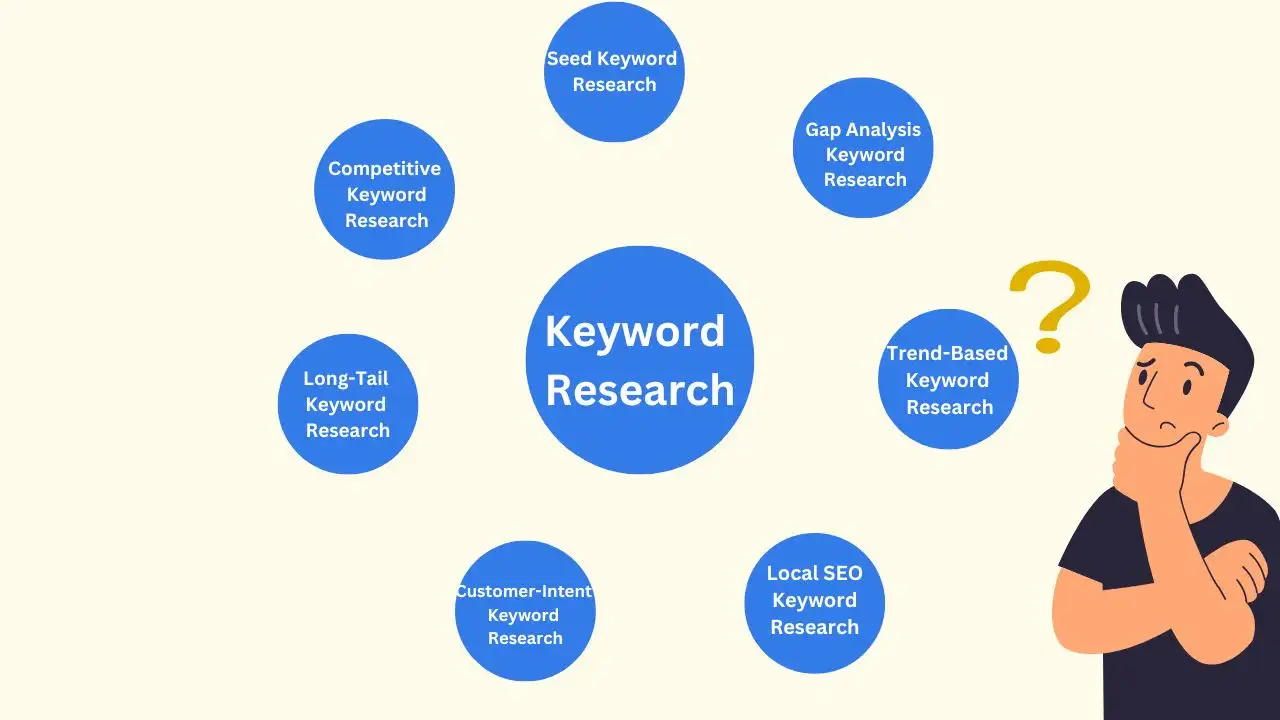
Seed Keyword Research:
Seed keywords are the foundation of your keyword research. They are broad terms related to your Product, service, or content theme. This research starts without using tools, relying instead on understanding your business and target audience.
Metrics and Dimensions:
- Search Volume: General popularity of the term.
- Relevance: How closely is the keyword related to your offerings?
Competitive Keyword Research:
This involves analyzing the keywords your competitors rank for, particularly those driving site traffic. It helps identify gaps in your strategy and opportunities to compete on specific terms.
Metrics and Dimensions:
- Keyword Difficulty/Competition: A measure of how hard it will be to rank for a keyword.
- Search Volume: To gauge the potential traffic.
- SERP Features: Identifies if there are special search features (e.g., featured snippets) you can target.
Long-Tail Keyword Research:
Long-tail keywords are longer and more specific keyword phrases. They often have lower search volume but higher conversion rates due to their specificity.
Metrics and Dimensions:
- Search Volume: Lower than short-tail but essential for niche targeting.
- Conversion Rate: Potential effectiveness in converting searches to actions.
- Click-Through Rate (CTR): Estimated click rate for a given SERP position.
Customer-Intent Keyword Research:
Focusing on the searcher’s intent (informational, navigational, transactional, and commercial investigation), this research aims to identify what the user intends to do with the information.
Metrics and Dimensions:
- Search Intent: The purpose behind a search query.
- CTR and Conversion Rate: For gauging the effectiveness of keywords in meeting user intent.
- Engagement Metrics: Time on site, pages per session, for understanding if the content meets the user’s needs.
Local SEO Keyword Research:
Local SEO keyword research targets geographic-specific terms to capture the attention of users searching for services or products in their area.
Metrics and Dimensions:
- Local Monthly Search Volume: Number of searches for the keyword in a specific region.
- Location Relevance: How relevant is the keyword to a local audience?
- Regional Competition: Difficulty of ranking for local terms.
Trend-Based Keyword Research:
Identifying keywords currently trending or having seasonal popularity to capture traffic related to specific events, seasons, or trending topics.
Metrics and Dimensions:
- Search Volume Over Time: How to search interest varies.
- Trending Topics: Current hot topics in your industry.
- Seasonality: Peaks and troughs in search volume throughout the year.
Gap Analysis Keyword Research :
This involves identifying keywords that competitors rank for, but your site does not. It’s crucial for uncovering missed opportunities and areas for growth.
Metrics and Dimensions:
- Keyword Gap: The difference in keyword portfolios between you and your competitors.
- Opportunity Score: Potential traffic gains from targeting these missed keywords.
- Content Quality: Assessment of the top-ranking content for these keywords.
What are the Benefits of Keyword Research in SEO?
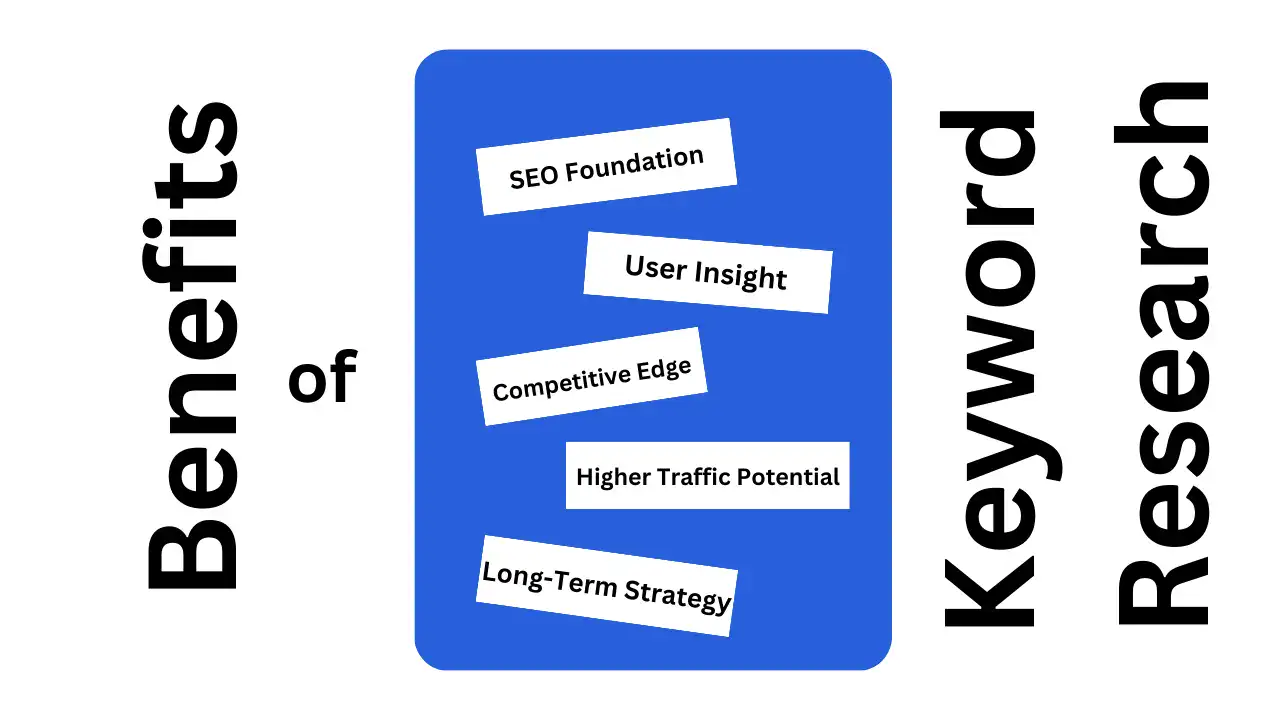
SEO Foundation:
It enables the identification of critical search terms that match with user queries, shaping strategies for content creation, on-page optimization, and link acquisition. By pinpointing what your audience seeks online, this foundational step ensures your website’s content and architecture are designed to meet their needs, enhancing your visibility in search engine results. This crucial process informs the development of SEO tactics and lays the foundation for driving targeted organic traffic to your website.
User Insight:
It offers valuable insights into market trends and consumer behaviors, enabling a more focused content strategy. It reveals what interests your target audience and the solutions they are searching for, allowing for the creation of highly relevant and engaging content. This deep understanding of user needs and preferences is instrumental in tailoring your digital presence to match their expectations, leading to enhanced engagement and conversion rates. Through this strategic insight, businesses can connect more effectively with their audience, fostering stronger relationships, and driving sustainable growth.
Competitive Edge:
Identifying niche keywords through meticulous research can provide a strategic advantage in saturated markets. By focusing on specific, less contested terms, businesses can carve out a unique space within the digital landscape, setting themselves apart from competitors. This approach not only aids in achieving higher search rankings more easily but also in attracting a more targeted audience likely to convert. Leveraging this competitive edge allows for optimizing resources and maximizes online visibility, contributing significantly to a brand’s digital success.
Higher Traffic Potential:
Maximizing your website’s potential to attract more visitors is pivotal in the digital landscape. This entails optimizing your content and SEO strategies to range with what your target audience is actively searching for. You can significantly enhance your site’s visibility and appeal by focusing on high-value keywords and tailoring your content to match user intent.
Effective optimization elevates your position in search results and improves user engagement and retention. The goal is to create a magnetic online presence that draws in a steady stream of traffic, setting the stage for higher conversions and sustained online growth. Embracing a holistic approach to digital marketing, from content creation to SEO, enables you to tap into the internet’s vast potential to connect with more potential customers.
Long-Term Strategy Development:
Keyword research is not just a short-term tactic but a cornerstone for developing a long-term digital strategy. It lays the foundation for creating relevant and engaging content over time, aligning with evolving search trends and user preferences. You can build a powerful content roadmap that supports sustained online growth by integrating keyword insights into your planning. This forward-thinking approach ensures your digital presence is both adaptive and enduring, positioning you for continued success in the dynamic online landscape.
How to start Keyword Research as a beginner?

Define Your Goals:
Establishing clear objectives is pivotal for steering your website or blog’s direction. Whether aiming to increase site traffic, generate leads, or enhance brand recognition, knowing your end goals shapes the foundation of your digital strategy. This clarity allows for targeted content creation, SEO, and online marketing efforts, ensuring every action contributes towards achieving these predefined ambitions. Setting specific, measurable goals creates a roadmap for success, guiding your online presence towards desired outcomes.
Enlarge Your Keyword List with Long-Tail Keywords:
Long-tail keywords are longer and specific keyword phrases. They often have lower search volumes but can lead to higher conversion rates for any business because they are more detailed and specific. Use your keyword research tool to explore long-tail variations of your seed keywords or focus key phrase .
Understand Your Audience:
Gaining insight into your audience, interests, and challenges is crucial for tailoring your digital content. By identifying the demographics, preferences, search behaviors and intentions of your target market, you can create content that resonates and provides value. This deep understanding enables you to engage more effectively, building content strategies that align with audience needs and expectations. It’s about crafting messages that speak directly to them, fostering a connection that drives trust, engagement and loyalty.
Use Keyword Research Tools:
Using keyword research tools is essential for uncovering valuable insights into search trends and opportunities. Tools such as Google Keyword Planner, SEMrush, Ahrefs, Moz and Ubersuggest offer comprehensive data on keyword relevance, search volumes, and competition levels. Utilizing these resources enables you to identify keywords most pertinent to your niche, enabling strategic content planning and optimization. These tools not only aid in discovering potential keywords but also in refining your SEO and content strategies to meet the specific needs of your target audience.
Use Keywords Naturally in Content:
Once you have your list of keywords, start creating content that naturally insets these keywords. Remember, the primary goal is to provide value to your audience , not just to insert keywords into your content.
How to Conduct Effective Keyword Research?

Brainstorming Session:
Initiating with a brainstorming phase is vital for generating a broad list of potential keywords related to your business, services, or content themes. Engage in creative thinking to explore various angles and topics that resonate with your audience. This collaborative effort encourages the pooling of diverse ideas, laying a foundation for a more inclusive and comprehensive keyword strategy. Such sessions are instrumental in uncovering hidden opportunities and ensuring a wide-ranging approach to content and SEO planning for maximizing conversions.
Utilize Keyword Research Tools:
Using keyword research tools is important for tapping into a wealth of data regarding search trends, volumes, and competitiveness across various topics. These platforms provide a deep dive into the dimensions of keyword relevance, allowing for identifying terms that best match your target audience’s queries.
By analyzing these dimensions, you can pinpoint opportunities for targeting phrases with high search potential yet lower competition. This strategic approach ensures that your content is visible and impactful, driving targeted traffic to your website. Utilizing these tools effectively enables crafting a content strategy that’s both informed and aligned with user intent and behavior, optimizing your digital presence for search engines and users alike.
Analyze Keyword Metrics:
Estimating keyword metrics is vital in refining your SEO strategy. This involves assessing search volumes, competition levels, keyword trends and the potential for engagement with specific phrases. By focusing on these metrics above, you can identify keywords that offer the best visibility and high conversion opportunity. High-volume, low-competition and buying keywords are particularly valuable, as are long-tail keywords that target more specific user intents. This analysis empowers the selection of keywords that can significantly enhance your website’s search engine performance.
Understand Keyword Intent:
Grasping the intent behind keywords is essential for aligning your content with what users seek. This step divides keywords into categories based on the user’s purpose, whether looking for information, purchasing, or navigating a specific site. Recognizing these intentions allows you to tailor your content to meet these needs effectively, improving user satisfaction and the likelihood of achieving higher rankings. By accurately matching your content with keyword intent, you ensure that your site becomes a go-to resource for users at various stages of their search journey.
Competitor Analysis:
Analyzing your competitors’ keyword strategies offers insights into their strengths and identifies untapped opportunities in your market. This process entails examining the keywords for which your competitors rank well, thus revealing gaps in their content that you can exploit. By understanding their approach, you can refine your strategy to fill these niches, potentially capturing a portion of their audience. This competitive intelligence guides optimizing your content and SEO efforts, positioning you more favorably in search results.
Prioritize Your Keywords:
Prioritizing your keywords is a strategic step that involves selecting terms that align closely with your business goals and audience interest. This process requires weighing each keyword’s relevance, search volume, and competition level to determine its potential impact on your visibility and engagement. Given your current SEO strength, you can efficiently allocate your resources by focusing on keywords that are most likely to attract your target audience and are achievable. This careful selection ensures that your efforts are concentrated on areas with the highest return, optimizing your content strategy for success.
What are the best practices for Keyword Research?
Focus on Long-Tail Keywords:
Concentrating on long-tail keywords is crucial for tapping into specific search queries with less competition and higher conversion potential. These longer, more descriptive phrases cater to users with precise intentions, making your content more likely to satisfy their specific needs. Targeting these niches can attract a more engaged audience, enhancing your site’s relevance and authority. This strategy improves your chances of ranking higher in search results and boosts the likelihood of conversions, as your content closely aligns with what users are actively seeking.
Consider Searcher Intent:
Considering searcher intent is key to crafting content that resonates with your audience’s needs and queries. You can create content that directly addresses these goals by understanding the motivation behind a search query, whether to learn, buy, or find a specific location. This alignment ensures your content is relevant and valuable, increasing its appeal to users and search engines. Making your content strategy to match these intents enhances user experience and fosters a stronger connection with your audience, improving search rankings and engagement.
Keep an Eye on Trends:
Staying attuned to evolving search trends is vital for keeping your content relevant and engaging. By monitoring shifts in user interests and industry developments, you can adapt your content strategy to reflect current demands. This proactive approach ensures your content remains fresh and interesting and positions you as a thought leader in your field. Adapting to trends enables you to capture new traffic opportunities and maintain a competitive edge in the dynamic digital landscape, ensuring your online presence continues to grow and thrive.
Regularly Update Your Keyword List:
Maintaining a dynamic keyword research strategy involves regularly revisions and updates to your keyword list. This process ensures that your content strategy adapts to changes in search behaviour and market trends, keeping your website relevant and competitive. By optimizing your keyword selection regularly, you can capitalize on emerging opportunities and address new audience needs. This ongoing optimization helps sustain your website’s visibility and effectiveness in attracting targeted traffic, supporting sustained growth and building trust in the ever-evolving digital environment.
How to Integrate Keywords into your content for SEO?
Integrating keywords into your website’s content is a nuanced art that balances search engine optimization with the natural readability for the audience. This delicate practice involves thoughtfully positioning your chosen keywords in critical elements such as titles, meta tags, meta descriptions, headings, and throughout the main text.
The goal is to enhance your content’s visibility to search engines while maintaining its originality and value for readers. By doing so, you ensure that your content is discoverable and resonates well with your target audience. Effective keyword integration supports your SEO efforts, driving higher rankings in search results without detracting from the user’s experience or the content’s authenticity. This approach leads to a more engaging and informative website, attracting and retaining a dedicated audience base.
Tracking Your Success
Monitoring the effectiveness of your SEO and content strategies is crucial for understanding their impact on your online presence. This involves using analytics tools to track key performance indicators such as organic traffic, search engine rankings, and user engagement metrics and dimensions.
By analyzing these data points, you can gauge your efforts’ success and identify improvement areas. Regularly assessing your progress helps inform future strategies, ensuring your digital marketing initiatives are aligned with your goals. This continuous evaluation process is essential for optimizing your online strategy. Keyword Research enables you to adjust tactics in response to changing trends and audience behaviors, thereby maximizing your website’s potential for growth and success.
Conclusion
Mastering the art of keyword research is an ongoing process that requires patience, practice, and continuous learning regularly. Understanding your audience, utilizing the right tools, and staying updated with SEO best practices can create a solid foundation for your website’s SEO strategy. Remember, the goal of keyword research is not just to increase traffic but to drive relevant traffic that aligns with your business objectives. With the right approach, keyword research can unlock the potential of your online content and lead you toward more tremendous online success.

Wow,Wonderful and informative article
Thank you so much